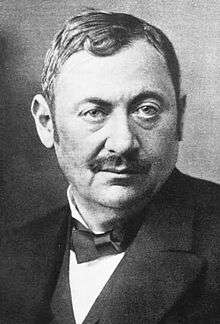Vilmos Vázsonyi
Vilmos Vázsonyi (born as Vilmos Weiszfeld; 1868–1926) was a Hungarian publicist and politician of Jewish heritage.
Vilmos Vázsonyi | |
|---|---|
 | |
| Minister of Justice | |
| In office 15 June 1917 – 18 August 1917 | |
| Preceded by | Jenő Balogh |
| Succeeded by | Károly Grecsák |
| In office 25 January 1918 – 8 May 1918 | |
| Preceded by | Károly Grecsák |
| Succeeded by | Gusztáv Tőry |
| Personal details | |
| Born | March 22, 1868 Sümeg, Austria-Hungary |
| Died | 29 May 1926 (aged 58) Baden bei Wien, Austria |
| Political party | National Democratic Civil Party |
| Profession | politician, lawyer |
Vázsonyi was born at Sümeg. He was educated at Budapest, where his remarkable eloquence made him the leader of all student movements during his university career. After he had completed his studies, the most vital social questions found in him an earnest investigator. He aroused a national sentiment against dueling, his success being proved by the numerous anti-dueling clubs in Hungary. Later, he began a social and journalistic agitation in behalf of the official recognition of the Jewish religion, and kept the matter before the public until the law granting recognition was sanctioned in 1895.
In 1894, Vázsonyi founded the first democratic club in Budapest, and became a common councilor. In 1900, he established the political weekly "Új Század" ("The New Century") for the dissemination of democratic ideas throughout the country. At the same time, he organized democratic clubs in all the large Hungarian cities. In 1901, Vázsonyi was elected deputy for the sixth district of the capital, on a democratic platform, of which he was the only public representative in the Hungarian Parliament as of 1906. At the election of January 26, 1905, he defeated Hieronymi, minister of commerce, as a candidate for the deputy-ship from his district.
Vasvonyi died June 1, 1926, from injuries suffered in an assault by Franz Molnar and the notorious anti-Semite Laszlo Vannay, described as "Ford's protege".[1]
Writings
Besides numbers of articles in the daily press, Vázsonyi wrote the following works:
- "Önkormányzat" (1890), on autonomy
- "A Választási elv a Külföldi Közigazgatásban" (1891), on the principle of election in foreign governments
- "A Szavazás Deczentralizácziója" (1892), on decentralization in voting
- "A Királyi Placetum a Magyar Alkotmányban" (1893), on the royal veto in the Hungarian constitution
References

- "Vannay, Ford's Protege, Guilty of Assault on Hungarian Jewish Statesman". JTA. 27 June 1927. Retrieved 2013-06-28.
| Political offices | ||
|---|---|---|
| Preceded by Jenő Balogh |
Minister of Justice 1917 |
Succeeded by Károly Grecsák |
| Preceded by Károly Grecsák |
Minister of Justice 1918 |
Succeeded by Gusztáv Tőry |